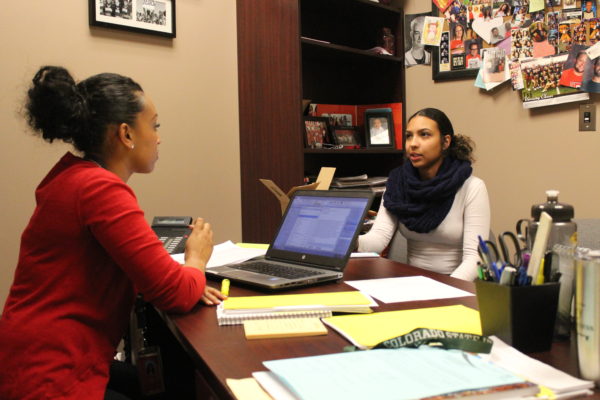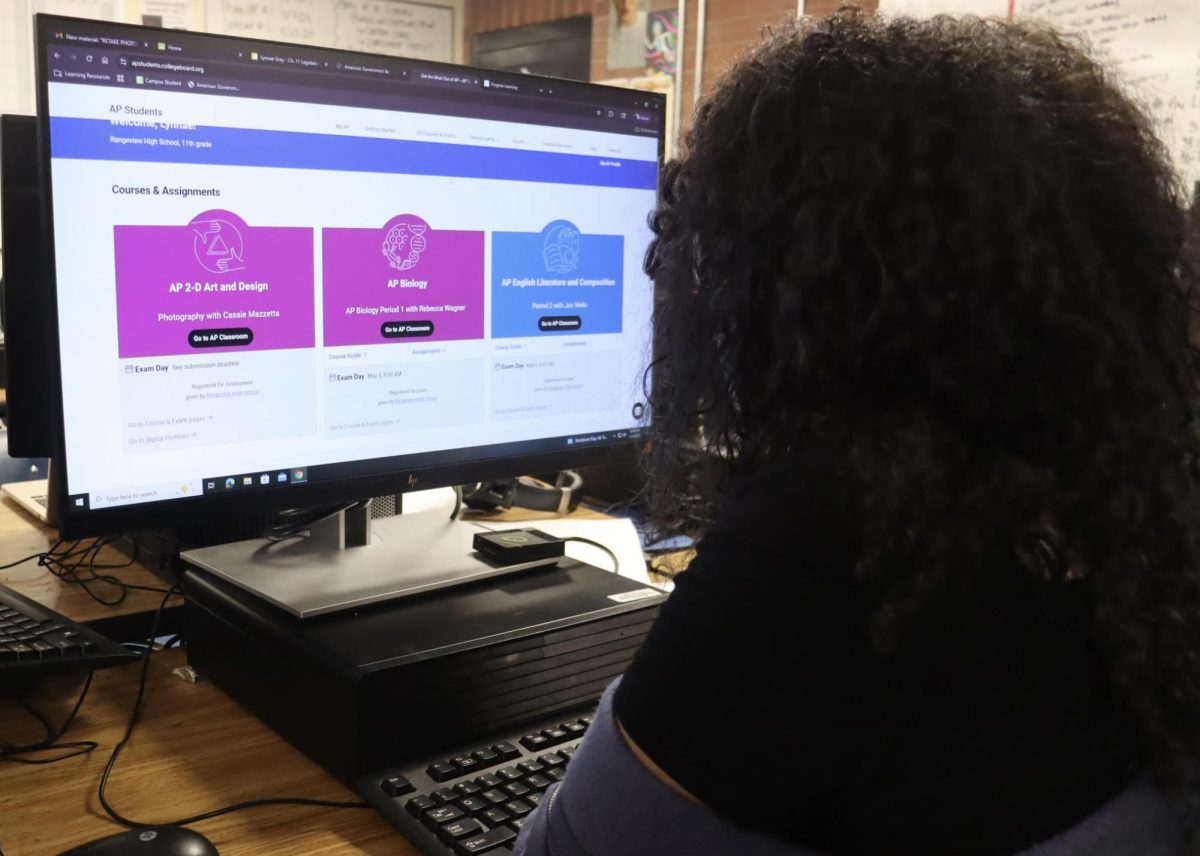Feature Photo By: Izzy Honey – Senior Daisha Austin talks to college advisor Betty Gessesse. There are several adults in the counseling office that are available to talk with students throughout the day about mental health, school stress, and issues at home. Walk-ins are possible as there is always a counselor of the day or you can make an appointment with your counselor.
“The average high school kid today has the same level of anxiety as the average psychiatric patient in the early 1950’s,” according to Psychology Today.
Mental illness is more prevalent now than it ever has been, which means that students are worrying about their mental health before they even reach adulthood.
Up to 50% of teens in the United States suffer from some mental illness, says youth.gov; the most common illnesses are anxiety and depression.
This means, at Rangeview alone, over 1,200 students’ lives are affected by their mental health. Students all around our building are juggling AP and honors classes, sports, clubs, family, stress, and mental illness.
Dealing with a mental illness is hard. It means panic attacks at random times and in random places; it means depressive episodes coming in waves; it means nights with restless or no sleep; it means an empty stomach too sick to eat; it means hopelessness.
According to Boston University’s College of Health and Rehabilitation, mental illness impairs a student’s ability to concentrate and motivate themselves to complete classwork and homework.
Many families do not want to, or simply cannot afford, to put their children on medication or into therapy and although it is very hard to juggle the weight of school and mental illness, there are things that can help to manage the burden that so many students are carrying.
According to Michael Lubet, a psychologist at Rangeview, mindfulness techniques are very important, providing examples like, “breathing exercises, imaging techniques, and Body Scan techniques (like meditation).”
Technology detoxes, though hard, can be tremendously beneficial. Set a time of night – maybe even half an hour before you go to bed – to turn your phone off and not use it again until morning. This could be your time to do homework, which will ensure that it gets done the day before it’s due and distractions are limited. A detox can be constructive even if it is done for a week or two at a time.
According to sleep.org, the light emitted from screens like phones and tablets suppress the chemical that helps you fall and stay asleep: melatonin. Which leads me to my next point.
Sleeping and eating well are important to mental health. Both give you energy to do everyday tasks. Cutting off technology at a certain time of night is just one way to get an hour or two more of sleep.
“Poor nutrition or lack of a variety of healthy foods can contribute to depression,” says www.nchpad.org. So, by just eating fresh fruit or vegetables once a day, your mental health can improve.

Journaling or writing can be very therapeutic. Writing your thoughts down on paper in order to process them will help you understand what you are feeling. Sometimes recording your experiences through poetry or diary entries will allow you to work through the things that seem so unclear.
Listen to your favorite music; it’s like therapy. Several studies have shown that music reduces stress, lessens symptoms of depression, improves mood, and helps you sleep better.
Homework, a big stress in many students lives, is always better with music, as is any everyday activity. There are even playlists on Spotify and Pandora that are dedicated to music to listen to while falling asleep.
Positive self-talk is key to your mental health. Think about the things you say to or about yourself. If you would not say it to someone else or want to hear it from someone else, you probably should not be saying it to yourself.
Thinking negatively about yourself will constantly put you in a negative state of mind and in a poor mood. It’s difficult because we are all hard on ourselves but you can always start small. Start with complimenting yourself or saying something nice after negative thoughts or words.
“I tell myself I have to be better not only for me but the people around me,” states junior Jessica Gondek who deals with depression. “It’s [a] constant wave of self encouragement.”
Talk to someone you trust. Chances are, with the mental illness statistics stacked against teens, one of your friends is struggling with mental illness as well. Confide in them. Talk about how you are feeling and listen to them. Being able to find someone to empathize with is so helpful.
If you do not have a friend with a mental illness, find a peer or adult that you can go to. This could be a friend, sibling, teacher, parent, or school counselor. You are surrounded by people that can help you if you find the courage to reach out.
Lizzie Stacks, a junior who suffers from social and general anxiety, says, “On a bad day, the most important thing to me is to be around someone I love and care about that I can talk to.” She continues, mentioning, “I also try to put the phone down, take a walk or a nap – whichever comes first – and then watch something happy to keep my mind distracted.”

Finding a hobby you love will lighten your mood and there are always things you can find that you are passionate about.
“I color and I walk my dog,” says junior Karina Estrada, who suffers from anxiety, depression, and borderline personality disorder. “Sometimes sleep or a shower helps. I try to ground myself and therapy helps day to day.”
If you enjoy the outdoors, go for a walk at the end of the day or try to go on a hike a couple times a month. If you prefer staying inside, find books you want to read, buy a coloring book, pick up painting, or learn to cook your favorite meals.
Know your limits. No one knows you better than you know yourself and it’s important that you do not push yourself too hard in uncomfortable situations. A little discomfort, despite it not being ideal, can be constructive but don’t go farther than you can handle.
Sometimes taking mental health hours, or even days, can be more beneficial than pushing your limits. If you do not feel like you can handle going out with friends to a certain place because it may be overstimulating, then it’s 100% okay to refrain from that activity. Most of the time, your friends will understand and if they don’t, it’s more important to take care of yourself than it is to please others. You do not want to put yourself in a compromised position.
Many doctors say that the best way to treat a mental illness is a combination of medications and therapy, but that can be pricey and time-consuming or just not an option for several families. It is still important to address the problems you are facing in a healthy and constructive way and these are just some of the ways to address your mental health.
Check out 7 Cups of Tea. It is a website that offers millions of chat rooms or one-on-one listening sessions to help people work through hard times or even just connect with others.
Books stores such as Barnes and Noble offer a large selection of self-help books.
As Lubet says, “usually a student would want to talk with a mental health professional if they had more acute feelings of depression due to self-harm concerns.”
If your mental illness is serious, it is important to reach out to a trusted adult and find help.






